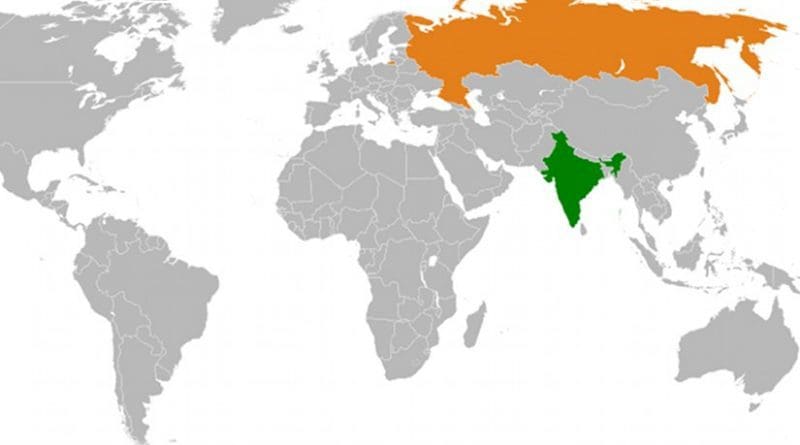Russia-India Strategic Partnership 2012: Contextual Imperatives For Enhancement – Analysis
By Dr. Subhash Kapila and SAAG
By Dr. Subhash Kapila
“India is one of our strategic privileged partner …. and speaking from the point of view of geographical representation …. India is number one”. — President Putin, December 2004
“The Declaration of Strategic Partnership between India and Russia signed in October 2000 became a truly historic step. The developments of the first decade of the 21st Century confirmed that it was a particularly significant and timely step.” — President Putin December 23, 2012
President Putin’s visit to New Delhi for the Annual Summit on December 22, 2012 provides the appropriate moment for a review of the contextual strategic imperatives for enhancement of this vital relationship. Moreso, when in recent times some hairline cracks seem to have crept-in on both sides in terms of future perspectives on this strategic partnership.
The Indian policy establishment flush with the heady excitement of the decade-old US-India Strategic Partnership, though still evolving, perceptively seems to be overlooking the time-tested and six decades of strategic value- added Russia-India Strategic Partnership.
President Putin was not only the architect of Russia’s strategic resurgence in the first decade of the 21st Century but also the architect of the reclamation of the Russia-India Strategic Partnership which had drifted during the 1990s under President Yeltsin, under American pressures.
To set the contextual perspectives right, it needs to be pointed out that the Russian Constitution amended in 2008 provides for two terms of six years each. This means that President Putin can be in office till 2024. This should be significant for India in that it provides extended continuity in Russian policies under the stewardship of President Putin who in the first decade of his Century invested strongly in building the Russia-India Strategic Partnership.
Russia and President Putin cannot however be taken for granted by the Indian policy establishment as recent developments indicated. As a riposte to India’s overzealous strategic ardour for the United States, Russia indulged in political signalling to India of opening up politically to Pakistan. This included a couple of high-level Russian visits to Islamabad in 2012 and a visit by President Putin, later cancelled.
President Putin’s December visit to India came after eight weeks of postponement, seemingly as a result of Russian unhappiness with India on the Sistema telecom dispute, Russian nuclear plants liability issues and India overlooking the Russian fighter in the finalisation of its MRCA deal.
Contextually, in 2012, Russia and India can ill-afford to let resolvable minor differences overshadow the overall value of the Russia-India Strategic Partnership. The rapidly evolving geopolitical and geostrategic contours in Asia Pacific throw up strategic challenges and uncertainties for both Russia and India. The leadership in both Russia and India need to put their heads together and work out convergent initiatives to overcome them.
Strategic challenges for both Russia and India arise from China’s unrestrained military aggressiveness and brinkmanship over maritime sovereignty issues in South East Asia and East Asia and escalation of tensions in the unsettled border regions of the India-China Occupied Tibet borders. The United States strategic pivot to Asia Pacific generates its own strategic dynamics and newer alignments in Asia which Russia can ill-ignore as the second leading global power, or which India can ill-ignore by standing as a passive spectator, as China generates military turbulence on India’s borders and India’s contiguous regions.
Russia has commenced its own ‘strategic pivot’ to Asia in response to the United States strategic moves, and possibly also as a long-range reading of China’s military assertiveness. For any strategic pivot to Asia Pacific by Russia it cannot depend on China to further its national interests as there are inherent strategic contradictions in their respective national aspirations.
Russia’s strategic pivot to Asia Pacific can be furthered only by countries which have had a long history of strategic partnerships with Russia. In this direction, Russia would need countries like India and Vietnam, both regional powers of note. India is an emerging global player of consequence and could add strategic weight to Russian initiatives in Asia Pacific and also on the global stage.
To be noted for strategic analysis is the reality that Russia, China and Vietnam share borders with China with a common history of China contesting these borders.
India too has discovered that its evolving strategic partnership with the United States has not provided the strategic insurance that India sought when it initially changed its strategic directions in relation to its two military adversaries, China and Pakistan, both figuring markedly in its threat perceptions.
India today stands piquantly placed in 2012 strategically. Its choices are basically two and these are whether to bow strategically to reclaim the original flavour of its historical Russia-India Strategic Partnership and its enhancement or keep plodding towards the strategically unrequited US-India Strategic Partnership
The global and Asian security environment in 2012 does not brook ‘strategic equidistance’ from both leading global powers, a favourite euphuism of the Indian policy establishment for strategic vacillation and making hard choices.
The Russia-India Strategic Partnership suitably enhanced offers greater strategic dividends to India in terms of strategic perspectives. In this connection, this Author’s Concluding Observations in SAAG paper No 3732 dated 25 March 2010 bear repetition: “Russia is not carrying any ‘Pakistan Baggage’ in its policy approaches in South Asia and towards India. The Russia-India Strategic Partnership is better placed to serve India’s national security interests. To some Indians it may be devoid of glamorous embellishments but then in the end-game in strategically and politically turbulent times for India, a strategic partnership requires the assured stability of a strongly and deeply embedded ‘sheet anchor’. The Russia-India Strategic Partnership carries that distinction which stands historically validated”
India recently lived through turbulent times and in 2012 strategic perspectives ahead portend that much more strategic turbulence awaits India in the years ahead. India’s strategic choices therefore should be obvious.

